

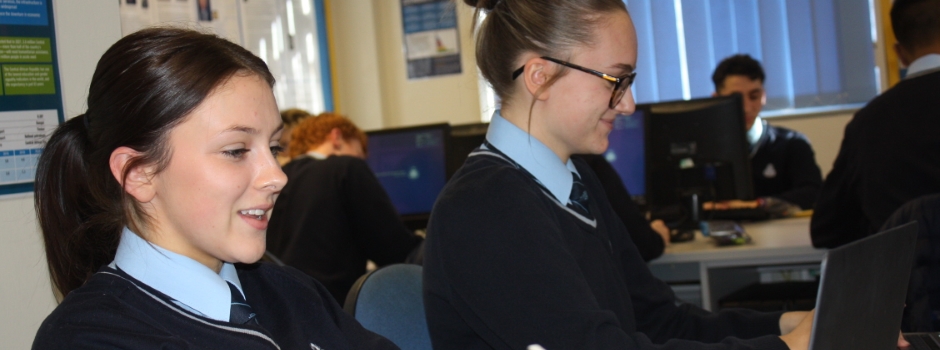


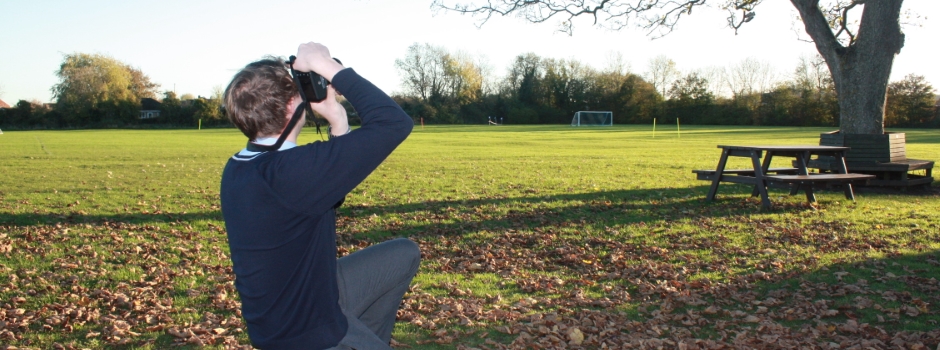





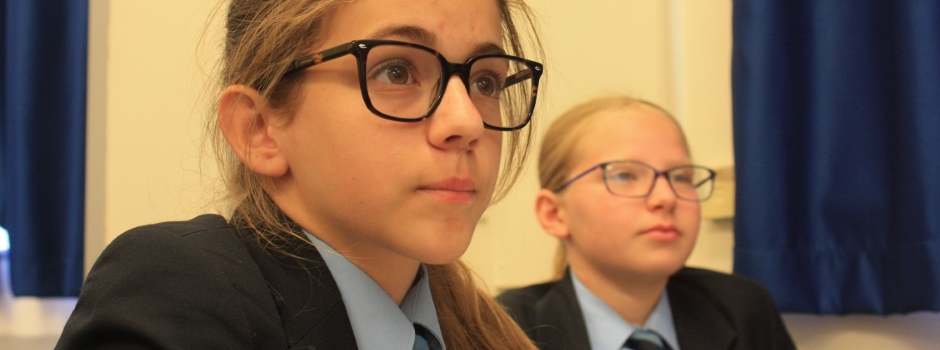
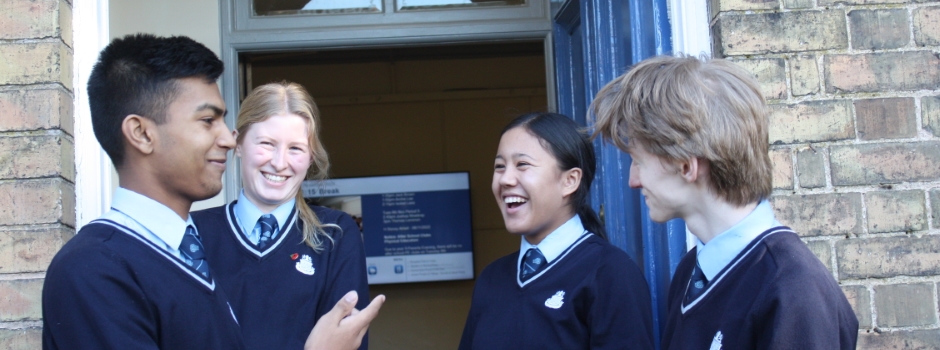




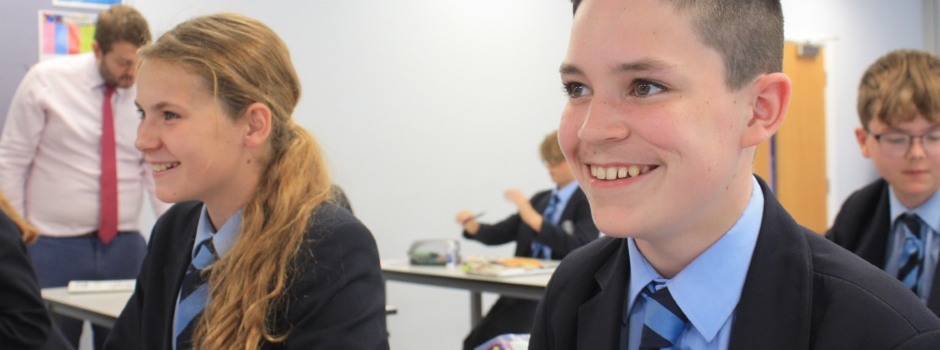





















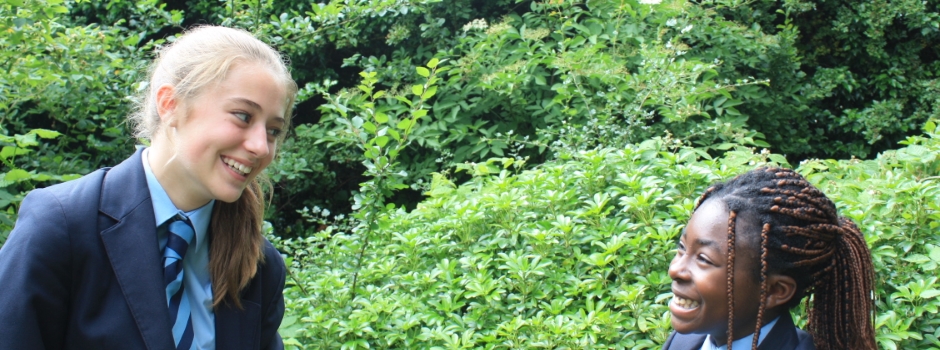



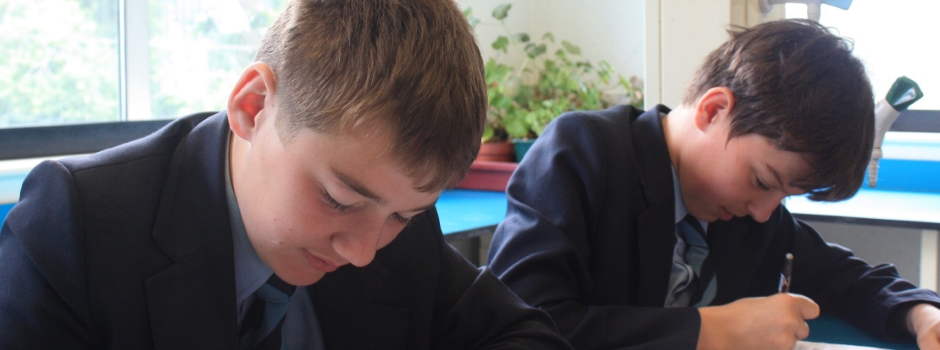
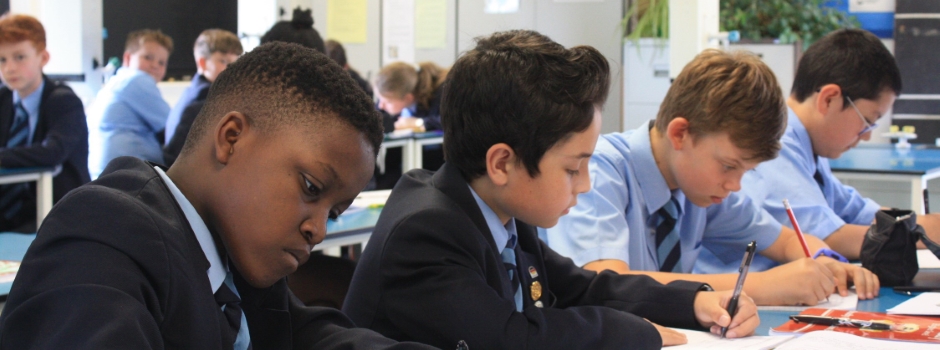





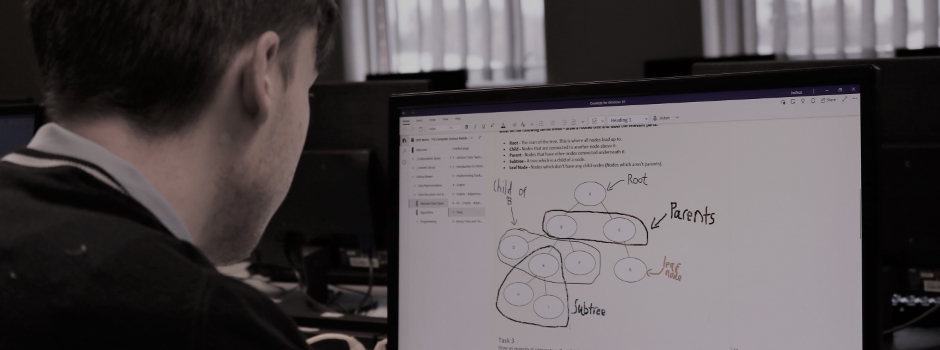
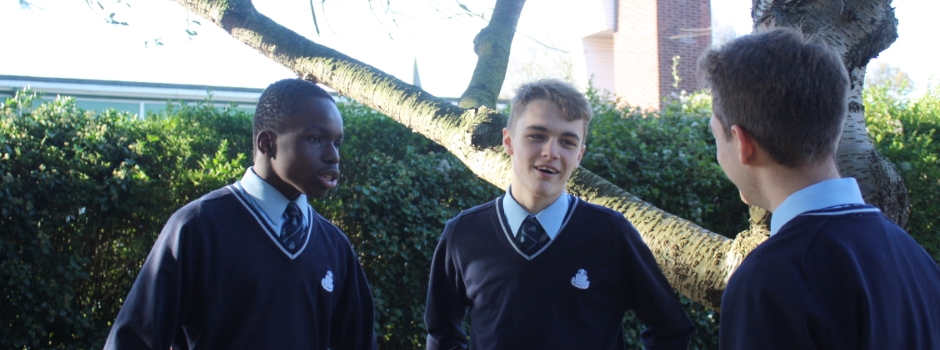
"We are so very grateful for the Outstanding education that Mitchell has received over the past 7 years with yourselves."
Music Dept - Curriculum on a Page
Showing the curriculum by subject
Music
Curriculum Details - 2023/2024 (Current)
| Year | Term 1 | Term 2 | Term 3 | Term 4 | Term 5 | Term 6 |
| 7 | ABRSM Grade 1 standard theory and aural skills – Base line Grade 1 theory test. Introducing note values. Students will learn to recognise, understand, compose and perform rhythms using the Djembe’s in a variety of simple time signatures. | ABRSM Grade 1 standard theory and aural skills Introducing pitch of the treble and bass clef up to one ledger line. Students will add pitch to their rhythm knowledge to play melodies on the keyboards. They will begin with basic tunes and progress to Christmas Carols (sacred music). | ABRSM Grade 1 standard theory and aural skills Introducing keys and harmony. Students will learn about degrees of the scale, tones and semitones, triads and their inversions by playing both keyboards and ukuleles. Chord diagrams will be introduced. | ABRSM Grade 1 standard theory and aural skills Introducing the compositional devices of structure and texture and the performance aspect of ensemble work. Utilising the skills learnt so far, students will compose and record their own 4-chord pop songs in groups combining rhythm, pitch and harmony. | ABRSM Grade 1 standard theory and aural skills Introducing intervals and genres. Utilising the learning so far, students will work on pieces of music from different genres such as Classical, Folk, and Blues. | ABRSM Grade 1 standard theory and aural skills Introducing elements of music. Students will compose and perform their own short piece on their chosen instrument that is to incorporate all the elements of music. |
| 8 | ABRSM Grade 2 standard theory and aural skills Introducing new note values. Students will learn to recognise, understand, compose and perform more complex rhythms using the Djembe’s or other percussion in a wider variety of simple time signatures. | ABRSM Grade 2 standard theory and aural skills Extending pitch of the treble and bass clef up to 2 ledger lines. Students will add wider pitch to their rhythm knowledge to play melodies on the keyboards focusing on seasonal Classical pieces and Popular Songs (Secular music). | ABRSM Grade 2 standard theory and aural skills Further keys and harmony. Students will extend the number of major keys they play in and learn about relative minor keys. This will include the difference between major and minor triads. | ABRSM Grade 2 standard theory and aural skills Expanding the compositional device of structure to include binary, ternary and rondo. Within small ensemble work students will compose and record their own pieces using formal western traditional harmonies and structures. | ABRSM Grade 2 standard theory and aural skills Extending vocabulary for elements of music and performance techniques. Students will work on their own performance pieces on their chosen instrument to give a rounded performance that is emotive. | Utilising all their ks3 learning, students will work on large ensemble skills as a whole class to perform a different piece of music each lesson from a variety of popular genres. |
| 9 | Solo Performance baseline. Solo performances in class are then on a rotation to begin each lesson for the remainder of ks4. Grade 3 and 4 theory and aural skills. Focus on Rhythm and Metre in performance, composition and appraising tasks. Perform in the soloist's concert last week of term. | Ensemble performance baseline - prepare and perform a group piece for the Christmas Concert. Grade 3 and 4 theory and aural skills. Focus on Pitch and Instrument recognition and techniques in performance, composition and appraising tasks. | Grade 3 and 4 theory and aural skills. Focus on Tonality and Sonority in performance, composition and appraising tasks. Perform in the soloist's concert last week of term. | Grade 3 and 4 theory and aural skills. Focus on Harmony in performance, composition and appraising tasks. | Grade 3 and 4 theory and aural skills. Focus on Structure in performance, composition and appraising tasks. Solo performance progress update | Ensemble performance progress update - prepare and perform a group piece for the Summer Celebration. Grade 3 and 4 theory and aural skills. Focus on Texture in performance, composition and appraising tasks. |
| 10 | Solo Performance progress update. Solo performances in class are then on a rotation to begin each lesson for the remainder of ks4. Grade 5 theory and aural skills. Focus on Rhythm and Metre in performance, composition and appraising tasks. Perform in the soloist’s concert last week of term. | Ensemble performance progress update - prepare and perform a group piece for the Christmas Concert. Grade 5 theory and aural skills. Focus on Pitch and Instrument recognition and techniques in performance, composition and appraising tasks. | Composition – Complete a full GCSE standard composition to a given brief. Appraising – Area of Study 1: Musical Forms and Devices. Complete a study of a Set Work assigned by the Exam Board and further listening and understanding around the topic. | Composition – Complete a full GCSE standard composition to a given brief. Appraising – Complete Area of Study 1: Musical Forms and Devices. | Composition – Complete a second full GCSE standard composition to a given brief. Appraising – Area of Study 4: Popular Music. Complete a study of a Set Work assigned by the Exam Board and further listening and understanding around the topic. | Ensemble performance progress update: prepare and perform a group piece for the Summer Celebration. Composition: Complete second piece. Appraising: Complete Area of Study 4: Popular Music. Choose your pieces for your solo and ensemble performance exams and rehearse them over the summer. |
| 11 | Solo and Ensemble Performance exams. Both to be completed by Half Term. Composition: Complete a full composition to a brief set by the exam board. Perfect a previous composition to submission standard. Appraising: Area of Study 2: Music for Ensemble and unprepared listening exercises. | Composition: Complete a full composition to a brief set by the exam board. Perfect a previous composition to submission standard. Both are due before Christmas. Appraising: Area of Study 2: Music for Ensemble and unprepared listening exercises. | Appraising: Area of Study 3: Music for Film and unprepared listening exercises. | Appraising: All Area’s of Study. Listening exercises, vocabulary and exam techniques. Final chance for resits of performance exam or composition amendments. | Appraising: Exam Practice and revision. | Exam Leave – Appraising exam. Preparation for ks5. |
| 12 | Set works and Composition - Area of Study A: Introduction to Sonata Form - Students will continue to develop analysis skills through analysis of Haydn 104 Mov. I. They will be introduced to sonata form and begin composing in this structure. | Set works and Composition - Area of Study A: Introduction to Sonata Form - Students will continue to develop analysis skills through analysis of Haydn 104 Mov. I. They will be introduced to sonata form and begin composing in this structure. | Optional Area of Study B (Popular Music), C (Musical Theatre), D (Jazz). Study the forms and devices of the chosen area and their importance within musical history. A wide range of listening and knowledge of historical events and movements is part of this study. Composition in style of chosen AoS. | Optional Area of Study B (Popular Music), C (Musical Theatre), D (Jazz). Study the forms and devices of the chosen area and their importance within musical history. A wide range of listening and knowledge of historical events and movements is part of this study. Composition in style of chosen AoS. | Optional Area of Study E (20th C), F (21st C) Study the forms and devices of the chosen area and their importance within musical history. A wide range of listening and knowledge of historical events and movements is part of this study as well as a set work. Composition in style of chosen AoS. | Optional Area of Study E (20th C), F (21st C) Study the forms and devices of the chosen area and their importance within musical history. A wide range of listening and knowledge of historical events and movements is part of this study as well as a set work. Composition in style of chosen AoS. |
| 13 | Set Works and Composition: Area of Study A Introduction to Sonata Form - Students will continue to develop analysis skills by recapping the Haydn movement 1, and use those skills to analyse Movements 2, 3 and 4. Compose to a chosen exam brief. | Set Works and Composition: Area of Study A Introduction to Sonata Form - Students will continue to develop analysis skills recapping the Haydn movement 1, and use those skills to analyse Movements 2, 3 and 4. Compose to a chosen exam brief. | Unfamiliar Listening, Composition Completions and Performance. Students will analyse various pieces in response to all Areas of Study. Chance to polish compositions ready for submission to the exam board. Completion of a mock public performance recital. | Revision on set works and unfamiliar listening. Performance recital date will be during this term. Live performance for a visiting examiner. | Revision on set works and unfamiliar listening. |